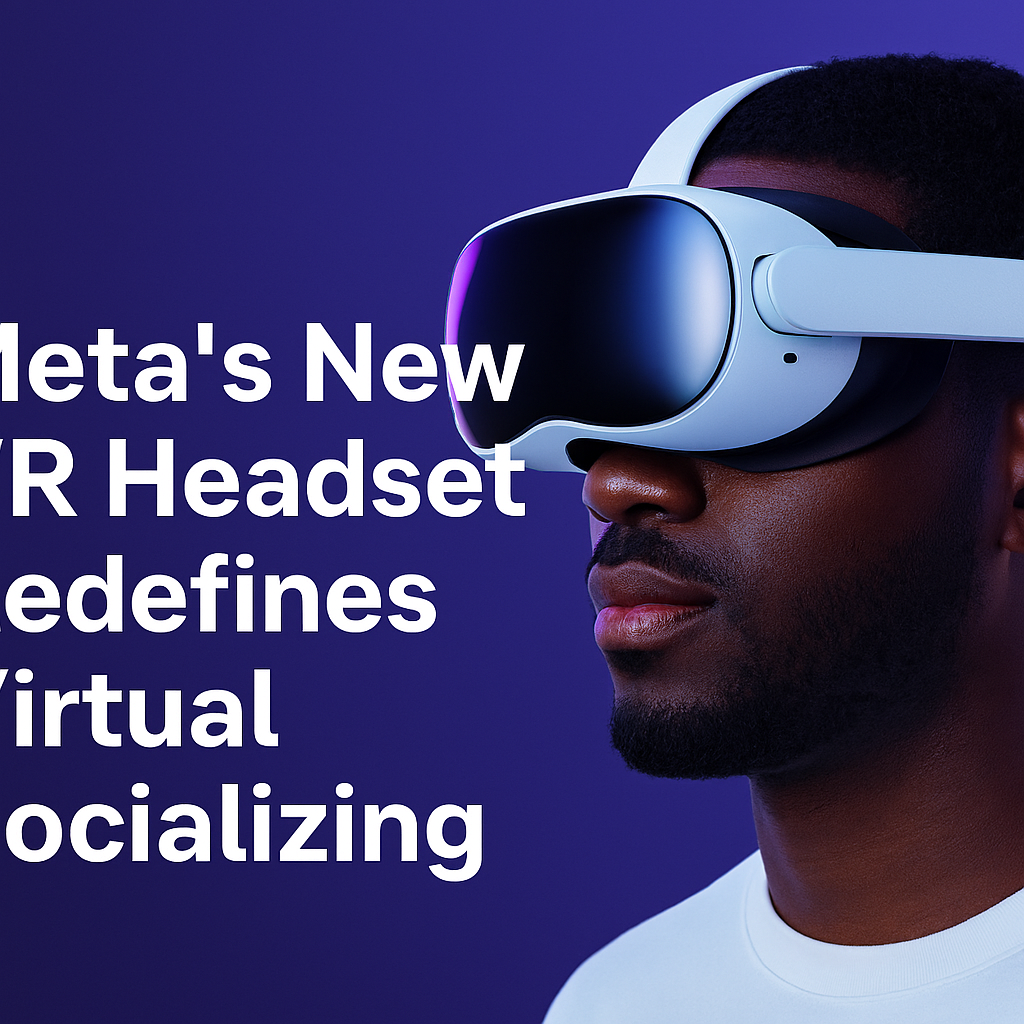The Meta VR headset is poised to revolutionize how we connect and socialize in virtual spaces. In the ever-evolving landscape of immersive technology, Meta continues to push boundaries. With the buzz surrounding Meta Connect 2025, the tech giant has once again captured the spotlight—this time with its latest developments in virtual reality. While smart glasses dominated the stage, the whispers of a new VR headset have sparked curiosity: Could this be the future of virtual socializing?
🧠 The Evolution of Meta’s VR Ambitions
Meta, formerly Facebook, has long been a pioneer in virtual reality. From the early days of Oculus Rift to the widely popular Meta Quest series, the company has consistently aimed to redefine how we interact digitally. The Meta Quest 3S, released last year, offered a budget-friendly gateway into VR gaming and experiences. But in 2025, the focus shifted dramatically.
At Meta Connect 2025, CEO Mark Zuckerberg emphasized smart glasses—particularly the Ray-Ban Meta Display Gen 2 and Oakley Vanguard AR glasses. These devices blend AI and augmented reality into sleek eyewear, signaling Meta’s vision for wearable tech. Yet, for VR enthusiasts, the real intrigue lies in the rumored next-gen headset.
🔍 What We Know About Meta’s New VR Headset
While Meta didn’t officially unveil the Meta Quest 4, leaks and insider reports suggest that two prototype headsets—codenamed “Pismo Low” and “Pismo High”—were in development. These models were expected to offer both budget and premium options, but recent rumors indicate they’ve been shelved in favor of smart glasses.
However, Meta hasn’t abandoned VR entirely. New software tools showcased at Connect 2025 allow users to scan their surroundings and recreate them in 3D within VR environments. This feature hints at deeper integration between physical and virtual spaces, laying the groundwork for more immersive social experiences.
🌐 Virtual Socializing: The Next Frontier
So, what does this mean for the future of virtual socializing?
Meta’s vision is clear: to create a seamless blend of real and virtual worlds. With advancements in spatial computing, users can now host virtual meetups in realistic 3D environments, attend concerts, or even watch movies together—just like filmmaker James Cameron described when he praised the Meta Quest for delivering “theater-grade 3D basically on your head”.
Imagine attending a birthday party in VR, where every guest is represented by a lifelike avatar, and the environment mirrors a real-world location. Or picture a virtual workspace where colleagues from across the globe collaborate in a shared digital office. These scenarios are no longer science fiction—they’re rapidly becoming reality.
🎮 Beyond Gaming: Social VR Experiences
While gaming remains a cornerstone of VR, Meta is expanding its horizons. Platforms like Horizon Worlds and VRChat have already demonstrated the potential of social VR. With improved hardware and software, Meta’s new headset could elevate these experiences to unprecedented levels.
Key features likely to enhance virtual socializing include:
- Eye and face tracking for more expressive avatars
- Spatial audio for realistic conversations
- Hand tracking and gesture recognition for natural interaction
- Room scanning to recreate real-world settings in VR
These innovations aim to make virtual interactions feel as authentic as face-to-face conversations.
📈 SEO Keywords to Watch
For tech bloggers and content creators, here are some SEO-friendly keywords to integrate:
- Meta VR headset 2025
- Future of virtual socializing
- Meta Quest 4 rumors
- Smart glasses vs VR headset
- Meta Connect 2025 highlights
- Social VR experiences
- Augmented reality glasses Meta
- Virtual reality for social interaction
Using these keywords strategically can help your blog rank higher and attract readers interested in cutting-edge tech.
🤔 Challenges Ahead
Despite the excitement, Meta faces several hurdles:
- Hardware limitations: High-end VR requires powerful processors and long battery life.
- User adoption: Not everyone is ready to embrace virtual socializing.
- Privacy concerns: Scanning rooms and tracking facial expressions raise ethical questions.
- Content moderation: Ensuring safe and inclusive virtual spaces is a complex task.
Meta must address these challenges to make VR socializing mainstream.
🚀 Final Thoughts: A New Era of Connection?
Meta’s new VR headset—whether officially launched or still in development—represents more than just a gadget. It’s a gateway to a new era of digital connection. As smart glasses and VR headsets converge, the line between physical and virtual continues to blur.
For general readers and tech enthusiasts alike, the question remains: Are we ready to socialize in the metaverse?
If Meta’s trajectory is any indication, the future of virtual socializing is not only possible—it’s inevitable.
